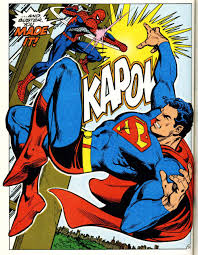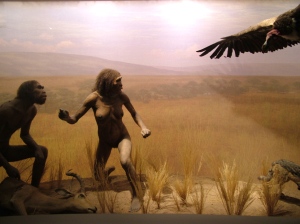The girl in the cafe is excited. She’s not wickedly excited or outrageously excited or deliriously excited or giddily excited or awesomely excited. Or any of the other great qualifiers our language is blessed with.
No she’s super excited and doesn’t she just have the jazz hands to show it. Why has this shit superlative suddenly become a vogue word? I don’t get it. Did I miss the meeting where we all got made honorary German exchange students?
It’s such a prissy, buttoned-up word. Every time I hear it I feel like cutting off my own balls and wearing them as ear-rings as I prance around the room singing The Sound of Music.
(Don’t worry, professional help is being sought).
It just seems to me that in the past we were more inventive with our superlatives.
When I was growing up a good thing could be: sweet, smart, ace, tops, fab, the bomb, the business, lish, mad, class, crucial. Or if you fancied more bite: wicked, savage, nasty.
Compared to this super’s like the kid with the scrubbed face in the corner whose been told his hands will drop off if he touches himself.
If you’re not convinced about what a bad word it is take a look at where it was getting used before its current vogue.
The supermarket. Oww that’s a fun place to hang out. Superman. What a charismatic, multilayered character he is. The Super Bowl. Idiots running headfirst at one another. The superego. My parents controlling me still through my own unconscious. Sounds a hoot!
And why do we need another superlative anyway? Especially one that’s been floating around in the detritus at the bottom of the word barrel for so long. Isn’t it about time we reined in this culture of false hype? It’s turning us all into first-grade morons.
Take the girl in the cafe. I don’t know what she was so super excited about but I can imagine that in all likelihood it probably wasn’t that super exciting. It probably wasn’t even just plain exciting. She was probably going to Target to get a new coat.
But these days there’s an unwritten social contract where we all have to pretend like the mundane events of our daily life are so great we should be spluffing in our pants at the very thought of them (“You’re going to get a coffee! Wow! Nice!”). Either that or they’re so awful they hardly bear thinking about (“You’re doctor says you can only have decaf. Man, that’s tragic!”).
If you offer no enthusiasm either way, people will assume you’re depressed. Which is depressing.
But it’s important to keep things in proportion. Otherwise when something truly impressive happens you’ll have trouble naming it for what it is. This happens all the time in 24-hour news. They expend so much energy spewing out fevered hype about non-stories that when a real story comes along – like the Boston bombings last year – everyone goes into shock and doesn’t know what to say.
Don’t get me wrong. I like a bit of hyperbole now and again (witness the title of this piece) but hyperbole all the time is rubbish. Witness the way the word ‘love’ has become so hackneyed through over use.
So let’s all take a deep collective breath, find some perspective, and…. deep breath out…. stop saying that shit word.
And don’t even get me started on super dooper.


